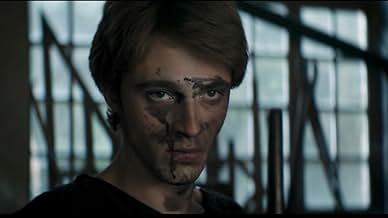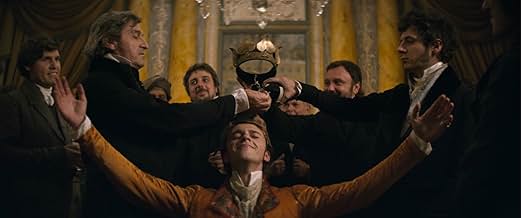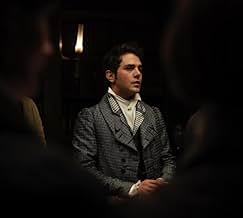AVALIAÇÃO DA IMDb
7,4/10
6,8 mil
SUA AVALIAÇÃO
Uma adaptação do romance "Lost Illusions" de Honoré de Balzac.Uma adaptação do romance "Lost Illusions" de Honoré de Balzac.Uma adaptação do romance "Lost Illusions" de Honoré de Balzac.
- Prêmios
- 9 vitórias e 23 indicações no total
Enredo
Você sabia?
- CuriosidadesThe character of Nathan d'Anastazio, played by Xavier Dolan, is actually a synthesis of three characters from the novel: Raoul Nathan, a scheming journalist, Daniel d'Arthez, a hard-working writer and Melchior de Canalis, a successful poet.
- Erros de gravaçãoThe Dejazet theater is mentioned, but the movie takes place in the early 1800s, during the Restoration, and this theater was inaugurated on September 27th, 1859.
- Trilhas sonorasConcerto in A Minor, BWV 1065: I. Allegro
Composed by Johann Sebastian Bach
Performed by Ensemble Bruno Rigutto, Gabriel Tacchino, Jean-Philippe Collard, Jean-Pierre Wallez, Michel Beroff & Paris Orchestral
Avaliação em destaque
The French cinema "de qualité" was heavily attacked by "nouvelle vague" critics back in the late 1950s and early 1960s. While many of the masters of the preceding decades were no longer giving the best of themselves (with the usual exceptions, such as Renoir or Bresson), the reason for the ridicule was the urgency that the critics (Godard, Truffaut, Rivette et al) had to make their own movies and with their writings they tried to "overthrow" the classics, who were too old to engage in diatribes and humiliations.
The worst of the case is that today we can take works by Clair, Duvivier, Carné or Clouzot and discover magnificent, beautiful, and lustrous films that those angry critics discredited. That cinema "de qualité" accompanies French cinema since cinema is cinema, it is not always of "quality", but there are outstanding works. What is ironic, furthermore and to the point, is that the new French cinema, despite the awards and praise given by festivals and the new critics, alienated the public from the cinemas en masse, Panama included, which had the Teatro Presidente, an exclusive theater for brand new European cinema.
And even more ironic, it is the return to the vein of "quality" cinema. In this category we can add «Illusions perdues», a film based on the novel by Honoré de Balzac that, in the last edition of the César award (supreme prize of the French film industry), it won five distinctions, including best film and screenplay based on another media (adaptation).
Everything is beautiful in the film, including the cast, everything is magnificent, from listening to Gérard Depardieu's hoarse, spirited, and passionate voice as the literary editor who cannot read or write, to Christophe Beaucarne's beautiful images (awarded the César). The weight of the film falls on a cast of young actors, possible big names of the future, who perform with equal panache and skill among veterans.
The anecdote of the film (and the novel) does not propose anything that has not been told before. What makes it very interesting is the social, media, labor, political, economic contexts - in a word, cultural - and their parallel with the present: Lucien de Rubempré is a young man from Angoulême, a country boy with immense poetic talent, to whom society denies him even the option of using his mother's last name, Rubempré, as "nome de plume", which would give him access to an estate, a place at the court and a noble title.
Lucien de Rubempré (Benjamin Voisin, who was 24-year-old actor when playing the role, winner of the César for Best New Actor) not only falls into the corrupt circles of Paris, with their vices and bad habits, he not only exercises vile and caustic journalism , but he literarily does not create anything beyond his book of poetry, written when he was 20 years old. In Paris he comes into direct contact with the city (at a time when the Bourbons were restored to the throne, betraying the ideals of the 1789 Revolution) and falls in love with Coralie, a young and beautiful theater woman, despised as an Andalusian and an actress. The film describes, with the aesthetic rigor that characterizes French cinema and with a current tone, the Parisian world at the beginning of the 19th century, that of the press, critics, publishers, authors, playwrights and the most rogue courtiers that, in their "salons" and circles, scheme to stay in power and marginalize the triumphant bourgeoisie.
The young cast includes Vincent Lacoste (Cesar winner for Best Supporting Actor) as another country boy, hashish smoker and unethical journalist; Canadian filmmaker Xavier Dolan as a talented novelist whom Lucien is able to destroy with one of his cruel and malicious reviews, who ends up being his only friend (and apparently his secret admirer) and Salomé Dewaels as Coralie, the young actress who adores Lucien and is reciprocated.
Lasting two and a half hours, «Illusions perdues» is a model of academic and prestige cinema for exportation, which does not skimp on details, evocations, reconstructions and becomes one more example of how European cinema represents itself better than Hollywood's attempts , tinged with a certain vulgarity, such as «Desirée», with a ridiculous Marlon Brando nasally applying "the Method" to evoke the image of Napoléon Bonaparte; or as «Dangerous Liaisons», with John Malkovich trying to give us, by means of the usual tics (possibly also of the "Method"), an 18th-century Parisian gentleman.
The worst of the case is that today we can take works by Clair, Duvivier, Carné or Clouzot and discover magnificent, beautiful, and lustrous films that those angry critics discredited. That cinema "de qualité" accompanies French cinema since cinema is cinema, it is not always of "quality", but there are outstanding works. What is ironic, furthermore and to the point, is that the new French cinema, despite the awards and praise given by festivals and the new critics, alienated the public from the cinemas en masse, Panama included, which had the Teatro Presidente, an exclusive theater for brand new European cinema.
And even more ironic, it is the return to the vein of "quality" cinema. In this category we can add «Illusions perdues», a film based on the novel by Honoré de Balzac that, in the last edition of the César award (supreme prize of the French film industry), it won five distinctions, including best film and screenplay based on another media (adaptation).
Everything is beautiful in the film, including the cast, everything is magnificent, from listening to Gérard Depardieu's hoarse, spirited, and passionate voice as the literary editor who cannot read or write, to Christophe Beaucarne's beautiful images (awarded the César). The weight of the film falls on a cast of young actors, possible big names of the future, who perform with equal panache and skill among veterans.
The anecdote of the film (and the novel) does not propose anything that has not been told before. What makes it very interesting is the social, media, labor, political, economic contexts - in a word, cultural - and their parallel with the present: Lucien de Rubempré is a young man from Angoulême, a country boy with immense poetic talent, to whom society denies him even the option of using his mother's last name, Rubempré, as "nome de plume", which would give him access to an estate, a place at the court and a noble title.
Lucien de Rubempré (Benjamin Voisin, who was 24-year-old actor when playing the role, winner of the César for Best New Actor) not only falls into the corrupt circles of Paris, with their vices and bad habits, he not only exercises vile and caustic journalism , but he literarily does not create anything beyond his book of poetry, written when he was 20 years old. In Paris he comes into direct contact with the city (at a time when the Bourbons were restored to the throne, betraying the ideals of the 1789 Revolution) and falls in love with Coralie, a young and beautiful theater woman, despised as an Andalusian and an actress. The film describes, with the aesthetic rigor that characterizes French cinema and with a current tone, the Parisian world at the beginning of the 19th century, that of the press, critics, publishers, authors, playwrights and the most rogue courtiers that, in their "salons" and circles, scheme to stay in power and marginalize the triumphant bourgeoisie.
The young cast includes Vincent Lacoste (Cesar winner for Best Supporting Actor) as another country boy, hashish smoker and unethical journalist; Canadian filmmaker Xavier Dolan as a talented novelist whom Lucien is able to destroy with one of his cruel and malicious reviews, who ends up being his only friend (and apparently his secret admirer) and Salomé Dewaels as Coralie, the young actress who adores Lucien and is reciprocated.
Lasting two and a half hours, «Illusions perdues» is a model of academic and prestige cinema for exportation, which does not skimp on details, evocations, reconstructions and becomes one more example of how European cinema represents itself better than Hollywood's attempts , tinged with a certain vulgarity, such as «Desirée», with a ridiculous Marlon Brando nasally applying "the Method" to evoke the image of Napoléon Bonaparte; or as «Dangerous Liaisons», with John Malkovich trying to give us, by means of the usual tics (possibly also of the "Method"), an 18th-century Parisian gentleman.
- EdgarST
- 28 de abr. de 2022
- Link permanente
Principais escolhas
Faça login para avaliar e ver a lista de recomendações personalizadas
- How long is Lost Illusions?Fornecido pela Alexa
Detalhes
- Data de lançamento
- Países de origem
- Central de atendimento oficial
- Idioma
- Também conhecido como
- Lost Illusions
- Locações de filme
- Opéra Comique, Place Boieldieu, Paris 2, Paris, França(Lucien at the theatre for the first time)
- Empresas de produção
- Consulte mais créditos da empresa na IMDbPro
Bilheteria
- Orçamento
- € 18.700.000 (estimativa)
- Faturamento bruto nos EUA e Canadá
- US$ 126.391
- Fim de semana de estreia nos EUA e Canadá
- US$ 15.182
- 12 de jun. de 2022
- Faturamento bruto mundial
- US$ 8.635.184
- Tempo de duração2 horas 29 minutos
- Cor
- Proporção
- 2.41 : 1
Contribua para esta página
Sugerir uma alteração ou adicionar conteúdo ausente
































